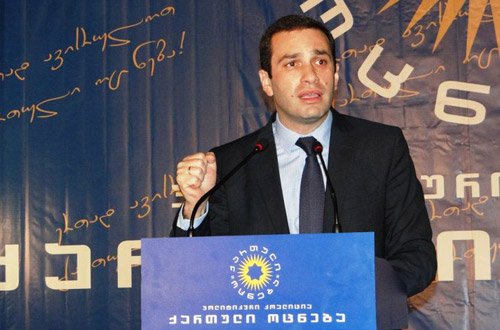
Deputy Prime Minister Alasania Is Demoted in Georgian Government
Publication: Eurasia Daily Monitor Volume: 10 Issue: 16
By:

Prime Minister Bidzina Ivanishvili signed a decree on January 21, stripping Minister of Defense Irakly Alasania of his dual position as deputy prime minister in the Georgian government https://www.civil.ge/eng/article.php?id=25670). The decree appeared on the government’s website (https://www.government.gov.ge/index.php?lang_id=geo&sec_id=1) one day after Alasania revealed he had had “a difficult and unpleasant conversation” with the prime minister regarding the presidential elections, scheduled to take place in fall 2013. The defense minister did not specify what the surrounding conditions of that “difficult conversation” were, or whether they spoke in a one-on-one setting or in the presence of other members of the government.
It appears the prime minister’s reaction came as a response to the argument he had with the minister of defense. Alasania made public the fact that he and Ivanishvili had “difficult talks” and could not agree on the issue of the presidential elections. Though, the defense minister later assured journalists that there was “no misunderstanding” between him and Ivanishvili, while the decision will allow him to focus more on his role in the Ministry of Defense (Civil Georgia, January 23).
In many democracies, such disagreements between the head of government and one of his or her ministers, even when they become public, do not cause a sensation. However, in Georgia, the general public still expects complete and unquestionable unity among the members of the government, while any disputes signify weakness. Therefore, the minister’s statement along with the prime minister’s decree created an uproar and many started to discuss the possibility of the disintegration of the recently elected Georgian Dream coalition (see EDM, January 17).
The Free Democrats party, led by Irakly Alasania, along with the Republican Party of David Usupashvili have been the backbone of the governing coalition. Usupashvili occupies a strategically important position of speaker of parliament. And serious controversies among them may undermine the future of Bidzina Ivanisvhvili’s political alliance. This is especially important as internal friction within Georgian Dream appears to rest on fundamental questions of the political power arrangements in the country. The Republican Party advocates the complete transition to an ostensibly parliamentary form of governance, where the president has only a symbolic role and is elected not through popular vote, but through elections in the parliament. On the contrary, Irakly Alasania and his Free Democrats insist that the president should be elected through a popular vote and retain important government functions, just as it was specified in the amendments to the country’s constitution that are scheduled to come into effect after the presidential elections in October 2013.
Prime Minister Ivanishvili openly sided with the Republican Party and ruled that the constitution be amended to ensure a parliamentary form of governance is firmly established in the country. Apart from that, Ivanishvili expressed his support for putting forward Vakhtang Khmaladze, a well-known and respected constitutional expert and one of the leaders of the Republican Party, as the Georgian Dream’s presidential candidate (see EDM, January 17).
Ivanishvili’s position, however, entirely undermines Alasania, as the latter had stated on numerous occasions that Georgia should remain a presidential republic or at least a presidential-parliamentary republic along the French model. Alasania also intended to run for the position of the head of the state in the fall. Alasania’s presidential ambitions are not entirely unfounded. “Alasania has a very high public rating. He outperforms all other politicians that might potentially take part in the presidential elections,” the head of the polling organization GORBI, Merab Pachulia, told Jamestown.
At the same time Ivanishvili’s candidate, Vakhtang Khmaladze has no chance of being elected president of Georgia through the popular vote. Yet, Khmaladze could be elected by the parliament, where the Georgian Dream coalition holds an absolute majority of the votes. However, will Ivanishvili be able to retain this overwhelming parliamentary majority if the coalition collapses and the Free Democrats abandon it?
Even after being removed from the position of the deputy prime minister, Irakly Alasania remains a formidable political figure. He still remains minister of defense because, according to the existing legislation, only the president of the country can dismiss him from this position, but Mikheil Saakashvili is waiting for further developments and is not in a hurry to make any drastic decisions. Saakasvhili’s position can best be understood as a tactical convergence of interests that emerged between Alasania’s team and the president’s party, the United National Movement. The presidential party’s leaders stated that the Georgian head of state should be elected by the entire voting population of the country, not by the parliament. The United National Movement is likely to advance its own candidate for the presidency: either the former Interior Minister Vano Merabishvili or Tbilisi’s mayor, Gigi Ugulava.
Leading legal experts do not support Ivanishvili’s push for indirect elections of the president. “This means that instead of a democratic division of power, [Georgia] will receive a one-party system again with a unitary decision-making center,” the ex-chairman of the constitutional commission, Professor Avtandil Demetrashvili, told Jamestown.
Another factor is also favorable for President Saakashvili in his unending standoff with Prime Minister Ivanishvili. Some perceive Ivanishvili’s publicly expressed disapproval of the minister of defense as an attempt to alter the pro-Western foreign policy orientation of Georgia; and this perception is not unreasonable. Alasania is a staunch supporter of Georgia’s accession into the North Atlantic Alliance and of expanding ties with the United States. “Demoting Irakly Alasania indicates that Ivanishvili is removing pro-Western politicians from his team to turn the country to the north [to Russia] and fall into Moscow’s embrace,” independent expert Mikhail Tavkhelidze argued in a recent interview with Jamestown.
Even though no substantial supportive evidence exists for such far-reaching claims at this point, a weakening of the coalition and a strengthening of the pro-presidential party will put Ivanishvili in a difficult position when he must make unequivocal choices about Georgia’s domestic and foreign policy goals.




